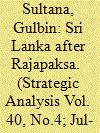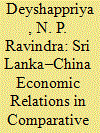| Srl | Item |
| 1 |
ID:
145811


|
|
|
|
|
| Summary/Abstract |
Since the fall of the Mahinda Rajapaksa government, there has been an apparent foreign policy shift in Sri Lanka. There is a growing view that the new National Unity Government (NUG), which came to power in January 2015 with Maithripala Sirisena as President, has shown its proclivities towards India and the US and moved away from China, especially under Prime Minister Ranil Wickremesinghe. In fact, it is commonly believed that the new government is allowing the US and India to increase their influence on Sri Lanka, the same way as Mahinda Rajapaksa had allowed China to increase its presence in the country. However, this essay argues that while relations with the US and India have improved under the current government, it will not be easy for Sri Lanka to come out of the Chinese influence both because of its own economic compulsions—to a large extent engendered by the debt it has availed from China during the last decade—and paradoxically, also because of China’s continued zeal to stay engaged in the economic domain.
|
|
|
|
|
|
|
|
|
|
|
|
|
|
|
|
| 2 |
ID:
169956


|
|
|
|
|
| Summary/Abstract |
The article examines recent trends in the economic relations between Sri Lanka and China focussing on trade, investment and tourism dimensions. Although bilateral economic ties between Sri Lanka and China have strengthened over time, the article demonstrates Sri Lanka’s low rank among China’s economic partners. For example, while China is the second-largest tourism partner of Sri Lanka in terms of tourist arrivals, Sri Lanka does not rank among even China’s top 25 tourist destinations.
Consequently, the article recommends certain policy priorities to ensure mutually beneficial economic relations. With regards to tourism, it recommends promoting Sri Lanka’s brand on Chinese e-tourism websites and social media, introducing user-friendly tourist apps in Chinese, strengthening air connectivity and celebrating Chinese festivals. Similarly, trade and investment could be facilitated by stronger links with Chinese cities and connecting Sri Lankan students in China to the Chinese industry via internships and building commercial networks from the ground up.
|
|
|
|
|
|
|
|
|
|
|
|
|
|
|
|